Vitamin K
Filter
-
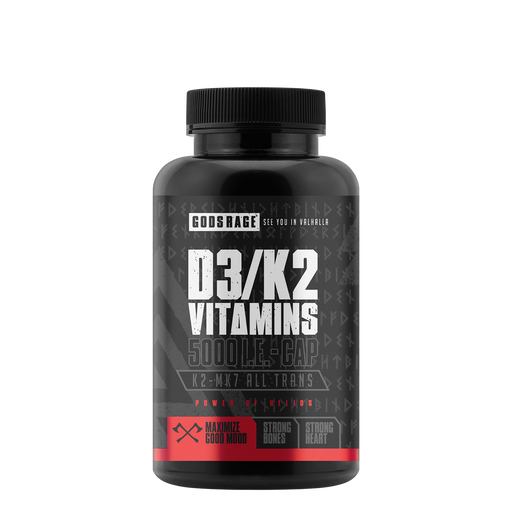 Ausverkauft
Original-Preis €19,90 - Original-Preis €19,90Original-Preis €19,90€19,90€19,90 - €19,90Aktueller Preis €19,90|/
Ausverkauft
Original-Preis €19,90 - Original-Preis €19,90Original-Preis €19,90€19,90€19,90 - €19,90Aktueller Preis €19,90|/D3/K2 Vitamins Gods Rage · 90 Kapseln
Gods Rage29 reviewsVitamin D3/K2 bringt eine ganze Reihe an Vorteilen für deine Gesundheit mit sich. Sowohl dein Immunsystem als auch deine Zähne, Knochen und auch de...
Vollständige Details anzeigenOriginal-Preis €19,90 - Original-Preis €19,90Original-Preis €19,90€19,90€19,90 - €19,90Aktueller Preis €19,90|/Ausverkauft -
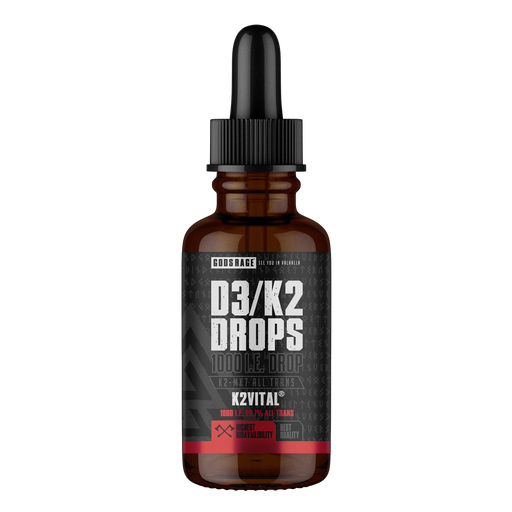 Jetzt 11% sparen
Jetzt % sparen
Original-Preis €24,90Original-Preis €24,90 - Original-Preis €24,90Original-Preis €24,90Aktueller Preis €22,16€22,16 - €22,16Aktueller Preis €22,16|/
Jetzt 11% sparen
Jetzt % sparen
Original-Preis €24,90Original-Preis €24,90 - Original-Preis €24,90Original-Preis €24,90Aktueller Preis €22,16€22,16 - €22,16Aktueller Preis €22,16|/D3/K2 Drops · 50ml
Gods Rage28 reviewsDie Vitamine D3 und K2 können deine Gesundheit und dein Wohlbefinden durch zahlreiche Effekte positiv beeinflussen. Das Immunsystem, die Zähne und ...
Vollständige Details anzeigenOriginal-Preis €24,90Original-Preis €24,90 - Original-Preis €24,90Original-Preis €24,90Aktueller Preis €22,16€22,16 - €22,16Aktueller Preis €22,16|/Jetzt 11% sparen Jetzt % sparen -
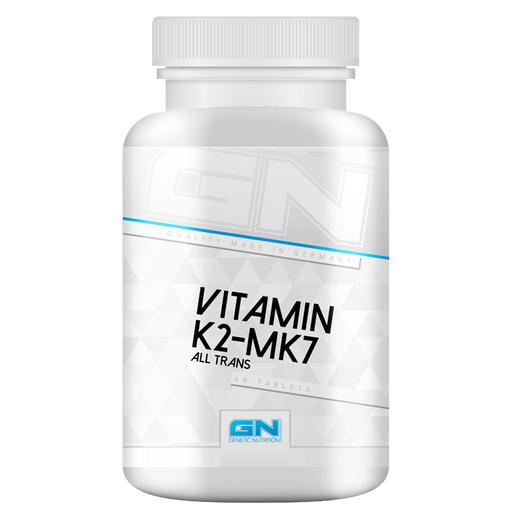 Jetzt 0% sparen
Jetzt % sparen
Original-Preis €13,90 - Original-Preis €13,90Original-Preis €13,90€13,90€13,90 - €13,90Aktueller Preis €13,90|/
Jetzt 0% sparen
Jetzt % sparen
Original-Preis €13,90 - Original-Preis €13,90Original-Preis €13,90€13,90€13,90 - €13,90Aktueller Preis €13,90|/Vitamin K2-MK7 All Trans · 60 Kapseln
GN Laboratories6 reviewsDas essentielle Vitamin für gesunde Knochen und ein gesundes Herz-Kreislauf System, das vor Osteoporose, Arteriosklerose und Krebs schützen und das...
Vollständige Details anzeigenOriginal-Preis €13,90 - Original-Preis €13,90Original-Preis €13,90€13,90€13,90 - €13,90Aktueller Preis €13,90|/Jetzt 0% sparen Jetzt % sparen -
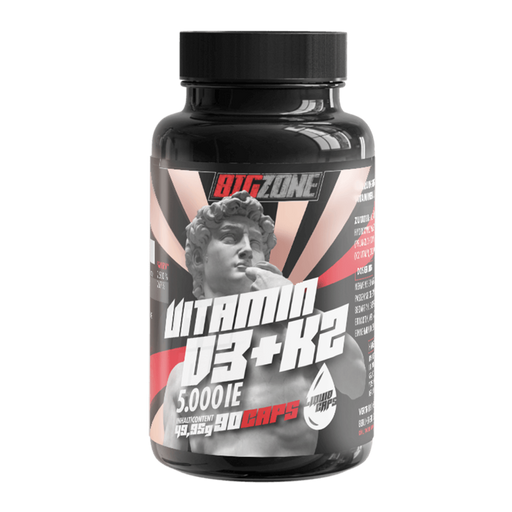 Jetzt 0% sparen
Jetzt % sparen
Original-Preis €24,90 - Original-Preis €24,90Original-Preis €24,90€24,90€24,90 - €24,90Aktueller Preis €24,90|/
Jetzt 0% sparen
Jetzt % sparen
Original-Preis €24,90 - Original-Preis €24,90Original-Preis €24,90€24,90€24,90 - €24,90Aktueller Preis €24,90|/Vitamin D3 + K2 · 90 Liquid Caps
Big Zone3 reviewsVitamin D trägt zu einer normalen Funktion des Immunsystems bei Vitamin D trägt zur Erhaltung einer normalen Muskelfunktion Vitamin D trägt zur Er...
Vollständige Details anzeigenOriginal-Preis €24,90 - Original-Preis €24,90Original-Preis €24,90€24,90€24,90 - €24,90Aktueller Preis €24,90|/Jetzt 0% sparen Jetzt % sparen -
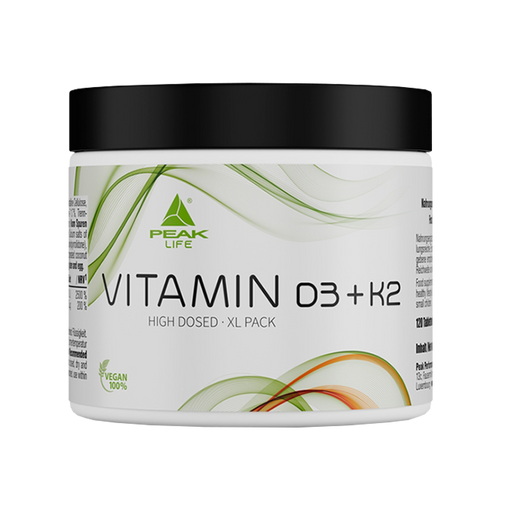 Jetzt 0% sparen
Jetzt % sparen
Original-Preis €19,90 - Original-Preis €19,90Original-Preis €19,90€19,90€19,90 - €19,90Aktueller Preis €19,90|/
Jetzt 0% sparen
Jetzt % sparen
Original-Preis €19,90 - Original-Preis €19,90Original-Preis €19,90€19,90€19,90 - €19,90Aktueller Preis €19,90|/Vitamin D3 + K2 · 120 Tabletten
PEAK3 reviewsVitamin D3 + K2 - wichtig für Knochen, Immunsystem und Muskeln Hohe Dosierung 5000 I.U. (125 µg) Vitamin D + 150 µg Vitamin K pro Tablette Hohe Bi...
Vollständige Details anzeigenOriginal-Preis €19,90 - Original-Preis €19,90Original-Preis €19,90€19,90€19,90 - €19,90Aktueller Preis €19,90|/Jetzt 0% sparen Jetzt % sparen -
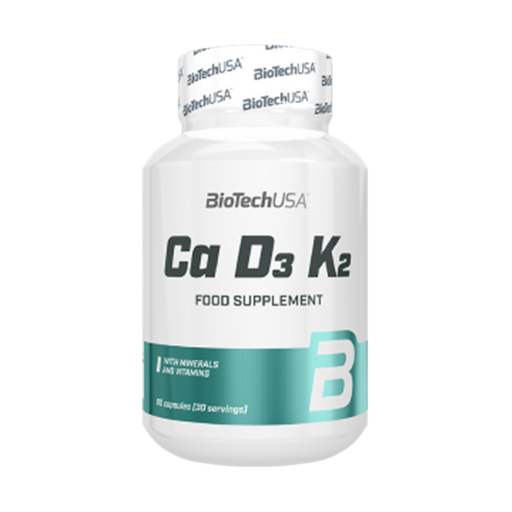 Jetzt 0% sparen
Jetzt % sparen
Original-Preis €10,90 - Original-Preis €10,90Original-Preis €10,90€10,90€10,90 - €10,90Aktueller Preis €10,90|/
Jetzt 0% sparen
Jetzt % sparen
Original-Preis €10,90 - Original-Preis €10,90Original-Preis €10,90€10,90€10,90 - €10,90Aktueller Preis €10,90|/Ca-D3-K2 · 90 Kapseln
Biotech USA2 reviewsKomplexe Zusammensetzung mit Calcium, Phosphor, Vitamin D3 und Vitamin K2 Ökonomische Verpackung Einfache Anwendung Calcium für Erhaltung normaler...
Vollständige Details anzeigenOriginal-Preis €10,90 - Original-Preis €10,90Original-Preis €10,90€10,90€10,90 - €10,90Aktueller Preis €10,90|/Jetzt 0% sparen Jetzt % sparen -
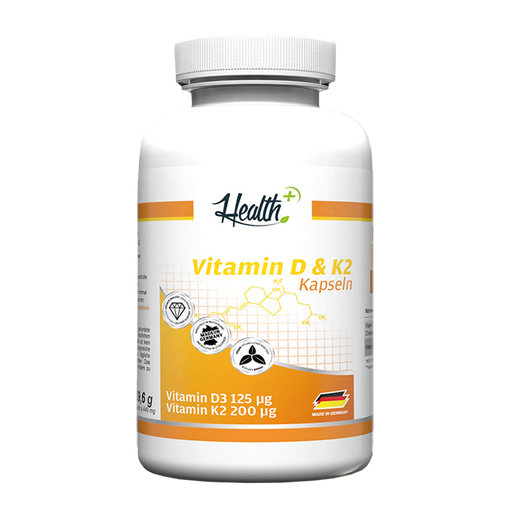 Ausverkauft
Original-Preis €19,90 - Original-Preis €19,90Original-Preis €19,90€19,90€19,90 - €19,90Aktueller Preis €19,90|/
Ausverkauft
Original-Preis €19,90 - Original-Preis €19,90Original-Preis €19,90€19,90€19,90 - €19,90Aktueller Preis €19,90|/Vitamin D3 & K2 Health+ · 90 Kapseln
Zec+1 reviewSynergistische Kombination: HEALTH+ Vitamin D3 & K2 Kapseln bieten umfassende Gesundheitsvorteile durch die effektive Verbindung von 5000 IU ...
Vollständige Details anzeigenOriginal-Preis €19,90 - Original-Preis €19,90Original-Preis €19,90€19,90€19,90 - €19,90Aktueller Preis €19,90|/Ausverkauft -
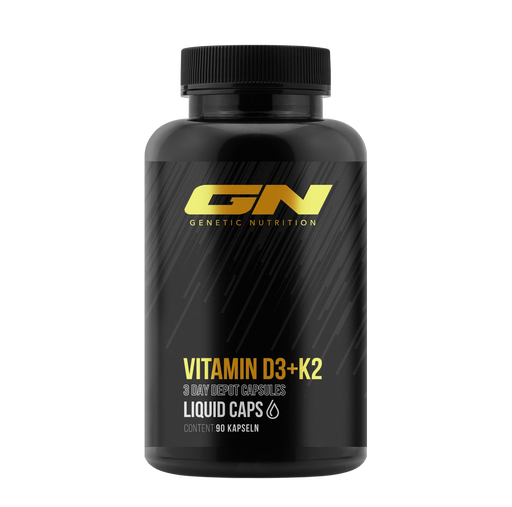 Jetzt 0% sparen
Jetzt % sparen
Original-Preis €24,90 - Original-Preis €24,90Original-Preis €24,90€24,90€24,90 - €24,90Aktueller Preis €24,90|/
Jetzt 0% sparen
Jetzt % sparen
Original-Preis €24,90 - Original-Preis €24,90Original-Preis €24,90€24,90€24,90 - €24,90Aktueller Preis €24,90|/Vitamin D3+K2 · 90 Liquid caps
GN Laboratories2 reviewsHochwirksame Kombination: Vitamin D3+K2 Liquid caps von GN nutzen Vitamin D3 und Markenrohstoff K2Vital® für optimale Knochen- und Zahngesundheit...
Vollständige Details anzeigenOriginal-Preis €24,90 - Original-Preis €24,90Original-Preis €24,90€24,90€24,90 - €24,90Aktueller Preis €24,90|/Jetzt 0% sparen Jetzt % sparen -
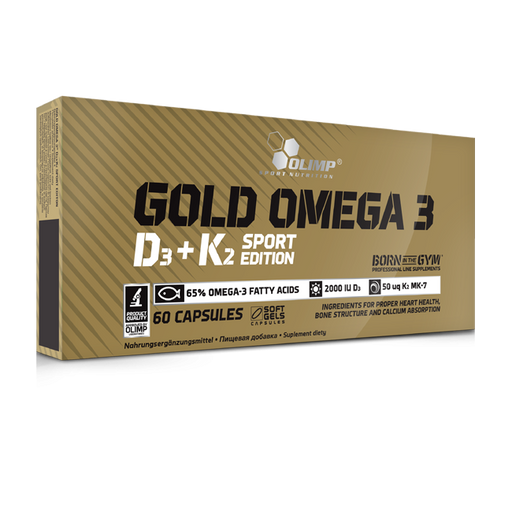 Jetzt 0% sparen
Jetzt % sparen
Original-Preis €19,90 - Original-Preis €19,90Original-Preis €19,90€19,90€19,90 - €19,90Aktueller Preis €19,90|/
Jetzt 0% sparen
Jetzt % sparen
Original-Preis €19,90 - Original-Preis €19,90Original-Preis €19,90€19,90€19,90 - €19,90Aktueller Preis €19,90|/Gold Omega 3 D3+K2 Sport Edition · 60 Kapseln
Olimp Sport NutritionNo reviewsProdukt: Gold Omega 3 D3+K2 Sport Edition - reichhaltiges Nahrungsergänzungsmittel mit Omega-3, Vitamin D3 und K2. Omega-3: Aus Kaltwasserfisch...
Vollständige Details anzeigenOriginal-Preis €19,90 - Original-Preis €19,90Original-Preis €19,90€19,90€19,90 - €19,90Aktueller Preis €19,90|/Jetzt 0% sparen Jetzt % sparen -
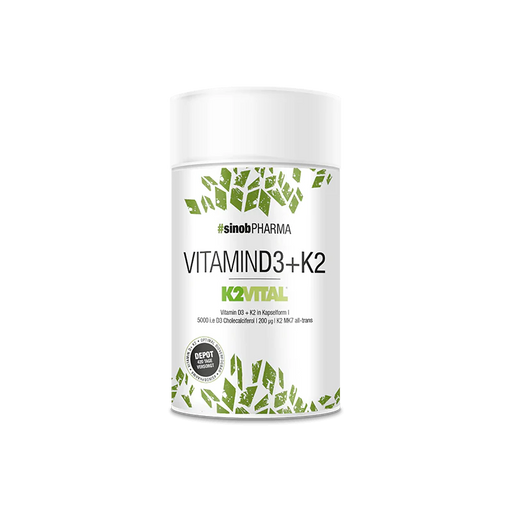 Jetzt 0% sparen
Jetzt % sparen
Original-Preis €19,90 - Original-Preis €19,90Original-Preis €19,90€19,90€19,90 - €19,90Aktueller Preis €19,90|/
Jetzt 0% sparen
Jetzt % sparen
Original-Preis €19,90 - Original-Preis €19,90Original-Preis €19,90€19,90€19,90 - €19,90Aktueller Preis €19,90|/Vitamin D3+K2 · 60 Kapseln
#sinobNo reviewsEssenzielle Vitamine: Vitamin D3 und K2 sind lebenswichtige, fettlösliche Vitamine. Sonnensynthese: Vitamin D kann bei ausreichender Sonneneins...
Vollständige Details anzeigenOriginal-Preis €19,90 - Original-Preis €19,90Original-Preis €19,90€19,90€19,90 - €19,90Aktueller Preis €19,90|/Jetzt 0% sparen Jetzt % sparen -
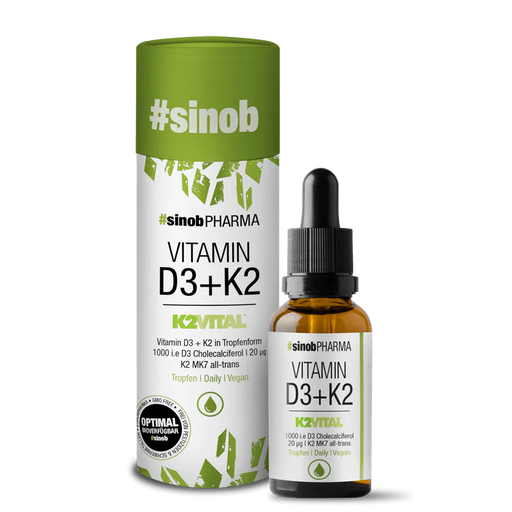 Jetzt 11% sparen
Jetzt % sparen
Original-Preis €16,90Original-Preis €16,90 - Original-Preis €16,90Original-Preis €16,90Aktueller Preis €15,04€15,04 - €15,04Aktueller Preis €15,04|/
Jetzt 11% sparen
Jetzt % sparen
Original-Preis €16,90Original-Preis €16,90 - Original-Preis €16,90Original-Preis €16,90Aktueller Preis €15,04€15,04 - €15,04Aktueller Preis €15,04|/Vitamin D3 + K2 Tropfen · 10ml
#sinobNo reviewsVitamin D Wichtigkeit: Essentiell für Knochen, Muskeln, Immunsystem. Vitamin D3 + K2 Tropfen von #SINOB: Praktische Lösung gegen Vitamin D-Mang...
Vollständige Details anzeigenOriginal-Preis €16,90Original-Preis €16,90 - Original-Preis €16,90Original-Preis €16,90Aktueller Preis €15,04€15,04 - €15,04Aktueller Preis €15,04|/Jetzt 11% sparen Jetzt % sparen -
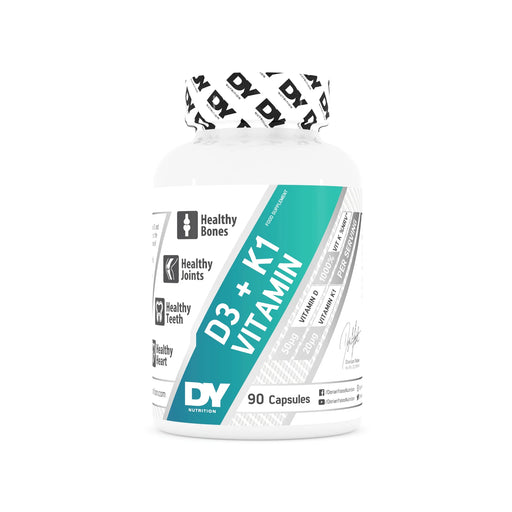 Jetzt 0% sparen
Jetzt % sparen
Original-Preis €12,90 - Original-Preis €12,90Original-Preis €12,90€12,90€12,90 - €12,90Aktueller Preis €12,90|/
Jetzt 0% sparen
Jetzt % sparen
Original-Preis €12,90 - Original-Preis €12,90Original-Preis €12,90€12,90€12,90 - €12,90Aktueller Preis €12,90|/Vitamin D3 + K1 · 90 Kapseln
DY NutritionNo reviewsVitamin D und K1 sind entscheidend für ein starkes Immunsystem und gesunde Knochen. Erhöht die Bioverfügbarkeit und Absorption im Vergleich zur ...
Vollständige Details anzeigenOriginal-Preis €12,90 - Original-Preis €12,90Original-Preis €12,90€12,90€12,90 - €12,90Aktueller Preis €12,90|/Jetzt 0% sparen Jetzt % sparen
1929 wurde es aus Luzerne isoliert. Im Jahre 1943 erhielten Henrik Dam, für die Entdeckung, und Edward Adelbert Doisy für die Aufdeckung der chemischen Natur des Vitamins K den gemeinsamen Nobelpreis in Medizin. Vitamin K1 ist die triviale Bezeichnung für 2-Methyl-3-phytyl-1,4-naphtochinon (auch α-Phyllochinon). Daneben gibt es noch das Vitamin K2 (2-Methyl -3- difarnesyl -1,4- naphtochinon), das auch als Menachinon oder auch als Farnochinon bezeichnet wird. Vitamin K1 findet sich natürlich in pflanzlichen Nahrungsmitteln wie grünblättrigem Gemüse wieder, während Vitamin K2 primär in tierischen Lebensmitteln und fermentierten Nahrungsmitteln vorkommt (2).Vitamin K2 kann in weitere Untertypen unterteilt werden, von denen MK-4 und MK-7 die wichtigsten sind.
Als Vitamin K3 bezeichnet man das ausschließlich künstlich hergestellte (2-Methyl-1,4-naphtochinon) Menadion. Es existieren noch weitere Vitamin-K-Derivate, die aber weniger von Bedeutung sind. Seinen Ursprung hat der Name Phyllochinon von dem Wort Phyllos, das Blatt. Der Buchstabe K wurde eingesetzt, nach dem der dänische Forscher Carl Peter Henrik Dam aus getrockneten Luzerne-Blättern eine fettlösliche Substanz isolierte, die eine ausgleichende Wirkung auf die Blutgerinnung zeigte (Koagulations-Vitamin) und man es der Einfachheit halber dann Vitamin K nannte.
Beschreibung
Vitamin K gehört zu den fettlöslichen Vitaminen und in die Gruppe der Phyllochinone. Phyllochinone sind eine Gruppe mehrerer Substanzen: Phyllochinon (Vitamin K1), und Menachinon (Vitamin K2), kommen natürlich vor, Menadion (Vitamin K3), Hydroxychinon (Vitamin K4) und andere sind hingegen synthetische Produkte, die heute (2005) nicht mehr im Handel erhältlich sind. Vitamin K1 (Phyllochinon) wird von Pflanzen, Vitamin K2 (Menachinon) bakteriell synthetisiert. Etwa die Hälfte des Bedarfs an Vitamin K2 wird durch Darmbakterien synthetisiert. Nur mit der Hilfe von Gallensäure kann Vitamin K resorbiert werden. Eine Erhöhung der Resorption wird durch die gleichzeitige Aufnahme von Fetten gesteigert. Vitamin K ist in der Leber an der Herstellung verschiedener Blutgerinnungsfaktoren beteiligt. Weiterhin ist Vitamin K über körpereigene Proteine, beispielsweise Osteocalcin und über Funktionen innerhalb des Stoffwechsels von Kalzium direkt am Knochenaufbau beteiligt.
Aufgrund der Hitzestabilität der Vitamin K-Gruppe treten beim Zubereiten, insbesondere beim Garen nur wenig Vitaminverluste auf. Vitamin K ist gleichzeitig auch gegenüber Sauerstoff O stabil. Unter Einstrahlung von Licht wird Vitamin K inaktiv und verliert schnell seine Bioverfügbarkeit. Alle Substanzen mit Phyllochinon-Wirksamkeit (K-Vitamine) leiten sich vom natürlicherweise nicht vorkommenden 2-Methyl-1,4-Naphtochinon (Menadion) ab. Voraussetzungen für die Vitamin-K-Aktivität sind neben dem unsubstituierten, aromatischen Ring eine lipophile Seitenkette (in trans Konfiguration). Optimal sind natürliche Terpenketten mit 20 Kohlenstoffatomen. Seitenketten unter 8 Kohlenstoffatomen führen außer bei Menadion zur Inaktivität. Es sind bis zu 100 Verbindungen mit Vitamin-K-Wirksamkeit bekannt, von denen aber nur drei von Bedeutung sind.
Aufgabe/Funktion
Die Hauptfunktion von Vitamin K besteht darin, dass es für die Synthese bestimmter Proteine (Prothrombin) notwendig ist, die in der Blutgerinnung eine wichtige Rolle einnehmen. Mit diesen Faktoren werden Blutungen gestoppt (Gerinnung). Auch bei der Biosynthese von Proteinen im Knochen, in der Niere, im Plasma und Bindegewebe spielt Vitamin K eine große Rolle. Eine der wichtigsten Funktionen von Vitamin K besteht in der Regulierung der Kalziumeinlagerungen. Mit anderen Worten ausgedrückt fördert es die Kalziumeinlagerung in den Knochen und verhindert unerwünschte Kalziumeinlagerungen in den Blutgefäßen und den Nieren (3, 4). Einige Wissenschaftler glauben, dass die Rollen von Vitamin K1 und K2 recht unterschiedlich sind und viele von ihnen sind der Ansicht, dass diese beiden Untertypen als separate Nährstoffe klassifiziert werden sollten.
Diese wird durch eine mit Tieren durchgeführte Untersuchung unterstützt, die zeigte, dass Vitamin K2 (MK-4) eine Verkalkung der Blutgefäße verhinderte, während Vitamin K1 hierzu nicht in der Lage war (5). Kontrollierte Humanstudien beobachten im Allgemeinen, dass Vitamin K2 Supplements die Knochen- und Herzgesundheit verbessern, während Vitamin K1 keine Vorzüge in dieser Hinsicht zu haben scheint (6). Es bedarf jedoch weiterer Humanstudien, um die funktionellen Unterschiede zwischen Vitamin K1 und K2 vollständig zu verstehen.
Vitamin K1 ist als fettlösliches Vitamin an die Resorption der Fette gebunden. Die Resorptionsrate beträgt 60-80 Prozent. Vitamin K2 gelangt dagegen durch Diffusion in das Darmgewebe. Die Vitamine K1 und K2 gelangen über das Blut zum Knochenmark, zur Leber und Niere. Hier kann eine Speicherung bis zu 14 Tagen erfolgen. Ausgeschieden werden die Vitamine über die Galle und teilweise über die Nieren. Die biologische Aktivität von Vitamin K ist auf seine Fähigkeit zurückzuführen, zwischen seinen oxidierten (Chinon) und reduzierten (Hydrochinon) Formen zu wechseln. Die wesentliche Bedeutung von Vitamin K liegt in seinem Beitrag zur posttranslationalen Einführung einer Carboxylgruppe in die γ-Position des Glutamins spezifischer Proteine, wodurch sich deren Eigenschaften ändern. Seine wichtigste Funktion ist die Beteiligung an der Synthese verschiedener Blutgerinnungsfaktoren.
Vorkommen und Zufuhr
Zahlreiche weit verbreitete Nahrungsmittel stellen reiche Quellen für Vitamin K1 dar, wogegen K2 in unserer Nahrung weniger weit verbreitet ist. Der Körper kann Vitamin K1 zu einem Teil in Vitamin K2 umwandeln, was nützlich ist, da die Menge an Vitamin K1, die durchschnittlich über die Nahrung zugeführt wird, etwa zehnmal so hoch wie die über die Nahrung aufgenommene Vitamin K2 Menge ausfällt. Aktuelle Untersuchungen deuten jedoch darauf hin, dass dieser Umwandlungsprozess ineffizient ist. Aus diesem Grund wirst Du mehr von einer höheren direkten Zufuhr von Vitamin K2 profitieren.
Vitamin K2 wird auch von Darmbakterien im Dickdarm produziert. Einige Untersuchungen legen nahe, dass ein Breitspektrum Antibiotikum zu einem Vitamin K2 Mangel beitragen kann (28, 29). Der durchschnittliche Gehalt von Vitamin K2 in der modernen Ernährung fällt erstaunlich niedrig aus. Dieses Vitamin findet sich hauptsächlich in bestimmten tierischen und fermentierten Nahrungsmitteln wieder, die sich bei den meisten Menschen nicht auf dem Speisplan befinden. Reichhaltige tierische Quellen für Vitamin K2 umfassen fettreiche Milchprodukte von mit Gras gefütterten Kühen, Eigelb, sowie Leber und andere Innereien (39). Da Vitamin K fettlöslich ist, hat dies zur Folge, dass fettarme tierische Produkte nicht viel Vitamin K enthalten.
Tierische Nahrungsmittel enthalten den MK-4 Subtyp von Vitamin K2, während fermentierte Nahrungsmittel wie Sauerkraut und Miso mehr der längeren Subtypen von MK-5 bis MK-14 enthalten (31). Wenn Du keinen Zugang zu diesen Nahrungsmitteln hast, oder sie nicht magst, dann stellt eine Einnahme von Vitamin K2 Supplements eine brauchbare Option dar. Die Vorzüge einer Supplementation mit Vitamin K2 können weiter gesteigert werden, wenn Vitamin K2 mit einem Vitamin D Supplement kombiniert wird, da diese beiden Vitamine synergistische Wirkungen aufweisen.
Hier ist ein kleiner Überblick über den Vitamin K Gehalt einiger Nahrungsmittel:
Die Tagesdosis von 65 µg (1 µg, auch 1 mcg = Millionstel = 0,000 001 g = 0,001 mg) Vitamin K1 ist beispielsweise enthalten in:
- 15 g Schnittlauch
- 25 g Rosenkohl
- 50 g Kalbsleber
- 3 Eiern
- 220 g Speisequark
- 400 g Champignons
- 500 g Erdbeeren
Weiterhin enthalten beispielsweise folgende Nahrungsmittel Vitamin K1 (1 mg = Tausendstel = 0,001 g):
- 200 g Rosenkohl 1,14 mg
- 300 g Vollkornbrot 37 mcg (0,037 mg)
- 200 g Blumenkohl 0,60 mg
- 30 g Müsli 15 mcg
- 200 g Kohlrabi 1,00 mg
Welche weiteren Gesundheitsvorzüge besitzt Vitamin K und was sagt die wissenschaftliche Studienlage hierzu aus?
Vitamin K könnte dabei helfen, Herzkrankheiten zu verhindern
Kalziumansammlungen in den Arterien rund um das Herz stellen einen wichtigen Risikofaktor für Herzkrankheiten dar (7, 8, 9). Aus diesem Grund kann alles, das diese Kalziumansammlungen verhindern kann dabei helfen, Herzkrankheiten zu verhindern. Man glaubt, dass Vitamin K dabei helfen kann zu verhindern, dass Kalzium in den Arterien abgelagert wird (10). Im Rahmen einer Studie mit einer Laufzeit von 7 bis 10 Jahren, lag die Wahrscheinlichkeit der Entwicklung einer Adernverkalkung bei den Probanden mit der höchsten Vitamin K2 Zufuhr um 52% niedriger und diese Gruppe wies außerdem ein um 57% niedrigeres Risiko auf, an Herzkrankheiten zu sterben (11).
Eine andere mit 16.057 Frauen durchgeführte Studie fand heraus, dass Probandinnen mit der höchsten Vitamon K2 Zufuhr ein deutlich niedrigeres Risiko für Herzkrankheiten aufwiesen – für jede 10 mcg Vitamin K2, die diese Frauen konsumierten, sank ihr Risiko für Herzkrankheiten um 9% (12). Vitamin K1 hatte bei keiner dieser Studien einen Einfluss. Man sollte jedoch im Hinterkopf behalten, dass es sich bei obigen Studien um Observationsstudien handelt, welche den Zusammenhang zwischen Ursache und Wirkung nicht nachweisen können. Die wenigen kontrollierten Studien, die durchgeführt wurden, verwendeten Vitamin K1, welches für diesen Anwendungsfall ineffektiv zu sein scheint. Es bedarf deshalb weiterer kontrollierter Untersuchungen, um den Zusammenhang zwischen der Vitamin K2 Zufuhr und dem Risiko für Herzkrankheiten genauer zu untersuchen. Es gibt jedoch einen sehr plausiblen biologischen Mechanismus für die Effektivität von Vitamin K2 und starke positive Korrelationen bezüglich der Herzgesundheit bei Observationsstudien.
Zusammenfassung: Eine höhere Zufuhr an Vitamin K2 wird mit einem reduzierten Risiko für Herzkrankheiten in Verbindung gebracht. Vitamin K1 scheint in dieser Hinsicht hingegen wirkungslos zu sein.
Vitamin K kann dabei helfen, die Knochengesundheit zu verbessern und das Osteoporoserisiko zu senken
Osteoporose, was wörtlich übersetzt so viel wie „poröse Knochen“ bedeutet, ist in der westlichen Welt ein weit verbreitetes Problem. Dieses Leiden betrifft insbesondere ältere Frauen und erhöht das Risiko für Frakturen rapide. Wie bereits erwähnt wurde, spielt Vitamin K2 beim Kalziumstoffwechsel eine zentrale Rolle – und das meiste Kalzium findet sich in den Knochen wieder. Vitamin K2 aktiviert die Kalzium bindenden Aktionen zweier Proteine – Matrix GLA Protein und Osteocalcin – welche beim Aufbau und der Aufrechterhaltung stabiler Knochen helfen (14, 15). Interessanterweise gibt es auch substanzielle Hinweise aus kontrollierten Studien, die zeigen, dass K2 große Vorzüge für die Knochengesundheit mit sich bringen kann. Eine über 3 Jahre andauernde Studie mit 244 postmenopausalen Frauen fand heraus, dass die Frauen, die Vitamin K2 Supplements einnahmen, eine sehr viel langsamere altersbedingte Reduzierung der Knochenmineraldichte aufwiesen (16).
In Japan mit Frauen durchgeführte Langzeituntersuchungen konnten ähnliche Wirkungen beobachten, auch wenn bei diesen Studien sehr hohe Dosierungen zum Einsatz kamen. Von 13 Studien konnte nur eine keine signifikanten Verbesserungen feststellen. Sieben dieser Studien, die Frakturen mit berücksichtigten, fanden heraus, dass Vitamin K2 das Risiko für Frakturen der Wirbelsäule um 60%, das Risiko für Hüftfrakturen um 77% und das Risiko aller nicht die Wirbelsäule betreffenden Frakturen um 81% senken konnte (17). Im Einklang mit diesen Studien werden Vitamin K Supplements in Japan offiziell zur Vorbeugung und Behandlung bei Osteoporose empfohlen (18). Einige Wissenschaftler sind jedoch nicht überzeugt, da sie zwei große Review Studien als Grundlage einer Empfehlung für die Verwendung von Vitamin K Supplements für diesen Zweck als nicht ausreichend ansehen (19, 20).
Zusammenfassung: Vitamin K2 spielt beim Knochenstoffwechsel eine essentielle Rolle und Studien legen nahe, dass es dabei helfen kann, Osteoporose und Frakturen zu verhindern.
Vitamin K könnte die Zahngesundheit verbessern
Wissenschaftler haben spekuliert, dass Vitamin K2 Auswirkungen auf die Zahngesundheit besitzen könnte. Es gibt bisher jedoch noch keine Humanstudien, die dies direkt untersucht haben. Basierend auf mit Tieren durchgeführten Untersuchungen und der Rolle, die Vitamin K beim Knochenstoffwechsel spielt, ist es jedoch realistisch anzunehmen, dass dieser Nährstoff auf einen Einfluss auf die Zahngesundheit besitzt. Eines der primären regulierenden Proteine im Bereich der Zahngesundheit ist Osteocalcin – dasselbe Protein, das für den Knochenstoffwechsel entscheidend ist und das über Vitamin K2 aktiviert wird (21). Osteocalcin stößt einen Mechanismus an, der das Wachstum von neuem Dentin anregt. Dentin ist das verkalkte Gewebe unterhalb des Zahnschmelzes (22, 23). Man glaubt, dass auch Vitamin A und Vitamin D hier eine wichtige Rolle spielen und synergistisch mit Vitamin K1 zusammenwirken (24).
Zusammenfassung: Man glaubt, dass Vitamin K2 bei der Zahngesundheit eine entscheidende Rolle spielt, auch wenn es an Humanstudien hierzu noch mangelt.
Vitamin K könnte dabei helfen Krebs zu bekämpfen
Krebs ist in der westlichen Welt eine weit verbreitete Todesursache. Auch wenn die moderne Medizin inzwischen viele Wege gefunden hat, Krebs zu heilen, treten weiterhin neue Krebsfälle auf. Aus diesem Grund sind effektive Präventationsstrategien von höchster Wichtigkeit. Interessanterweise wurden mehrere Studien zu Vitamin K2 und bestimmten Krebstypen durchgeführt. Zwei klinische Studien legen nahe, dass Vitamin K2 die Wiederkehr von Leberkrebs reduzieren und die Überlebenszeit verlängern kann (25, 26). Zusätzlich hierzu kam bei einer Observationsstudie mit 11.000 Männern heraus, dass eine höhere Vitamin K2 Zufuhr mit einem um 63% niedrigeren Risiko für fortgeschrittenen Prostatakrebs in Verbindung stand, während Vitamin K1 keine Wirkung besaß (27). Es bedarf jedoch weiterer qualitativ hochwertiger Studien, um eindeutige Schlussfolgerungen ziehen zu können.
Zusammenfassung: Studien zufolge kann Vitamin K2 die Überlebensrate und -dauer bei Patienten mit Leberkrebs verbessern. Männer, die die höchsten Mengen an Vitamin K2 konsumieren scheinen außerdem ein niedrigeres Risiko für fortgeschrittenen Leberkrebs aufzuweisen.
Mangelerscheinungen (Hypovitaminose)
Ein Vitamin K-Mangel ist eher selten, da bis zu 50 % des Bedarfs im Darm gebildet werden können. Leber- und chronische Magen- und Darmerkrankungen (Diarrhöe) fördern einen Vitamin K-Mangel. Durch die orale Einnahme von Antibiotika (Wachstumshemmung der Vitamin K liefernden Darmbakterien) kann es aber zur Hemmung der körpereigenen Blutbildung kommen; dies passiert aber nur bei gleichzeitiger Mangelernährung. Weiterhin kommt es auch häufig bei Osteoporose, wo ein erhöhter Verlust von Kalzium typisch ist, zu einem Vitamin K-Mangel. Wie auch bei anderen fettlöslichen Vitaminen, kann es bei einer intestinalen Fettresorptionsstörung (beispielsweise bei Gallengangsverschluss) zu Mangelerscheinungen kommen. Kommt es aber zu einem Mangel an Vitamin K, so tritt eine Verlängerung der Blutgerinnung ein. Bei Säuglingen kann es zu Hirnblutungen kommen. Verdauungsstörungen, chronische Lebererkrankungen und Blutungen in verschiedenen Geweben und Organen, wie beispielsweise an der Nasenschleimhaut, im Magen-Darm-Trakt und in der Muskulatur, sind möglich.
Folgen einer Überdosierung (Hypervitaminose)
Da Vitamin K keine toxische Wirkung aufweist (für ein 500faches der empfohlenen Menge sind keine toxischen Wirkungen bekannt), treten kaum Überdosierungen auf. Nach Injektion von Vitamin K in sehr hohen Dosen, können allergische Reaktionen und Veränderungen der Blutzusammensetzung auftreten.
Antagonisten
Man weiß, dass Vitamin K zur Synthese von Gerinnungsfaktoren (Prothrombin) unerlässlich ist. Die Gegenwart von Vitamin K Antagonisten (z.B. Warfarin, Dicumarol) klärte die Wirkungsweise dieses Vitamins erstmalig auf. So führte das in verdorbenen Klee vorhandene Dicumarol zu lebensgefährlichen Blutungen bei Rindern. Warfarin findet auch als Rattengift Verwendung. Mit Dicumarol gefütterte Kühe besitzen ein abnormes Prothrombin, das anders als das normale Prothrombin kein Ca2+ mehr bindet. Dies kommt durch die Änderung einer Aminosäure im Prothrombin zustande. Als Medikament zur Blutgerinnungshemmung wird häufig Phenprocoumon als Antagonist verwendet.
Bedarf
Die Festlegung des Vitamin-K-Bedarfs gestaltet sich aufgrund analytischer Probleme bei der Bestimmung diese Vitamins in Lebensmitteln sowie der Ungewissheit über die Höhe der Synthese durch Bakterien im Darm schwierig. Hinsichtlich des täglichen Bedarfs an Vitamin K besteht eine unterschiedliche Bewertung. Die Deutsche Gesellschaft für Ernährung empfiehlt: 65 µg für Frauen und 80 µg für Männer pro Tag. Da Säuglinge häufig unter einem Vitamin-K-Mangel leiden, weil Muttermilch nur einen geringen Vitamin K-Gehalt hat, wird oft eine Vitamin K-Prophylaxe empfohlen.
Bedarf im Sport
70-140mg am Tag.
Fazit
Vitamin K stellt eine Gruppe von Nährstoffen dar, die in die Vitamine K1 und K2 unterteilt werden kann. Vitamin K1 ist an der Blutgerinnung beteiligt und Vitamin K2 fördert die Gesundheit von Knochen und Herz-Kreislauf System. Es bedarf jedoch weiterer Studien zur Untersuchung der unterschiedlichen Rollen dieser beiden Untertypen von Vitamin K. Einige Wissenschaftler sind davon überzeugt, dass Menschen mit Herzkrankheiten regelmäßig Vitamin K2 Supplements einnehmen sollten, während andere darauf hinweisen, dass weitere Studien nötig sind, bevor solide Empfehlungen getroffen werden können. Alles in Allem ist jedoch klar, dass Vitamin K bei der Funktion des Körpers eine essentielle Rolle spielt. Um eine gute Gesundheit aufrecht zu halten, solltest Du deshalb darauf achten, adäquate Mengen an Vitamin K1 und K2 über die Nahrung zu Dir zu nehmen.
Referenzen
- https://link.springer.com/chapter/10.1007/978-1-4899-1789-8_19
- https://www.ncbi.nlm.nih.gov/pubmed/17158229
- https://www.ncbi.nlm.nih.gov/pubmed/3530901
- https://www.ncbi.nlm.nih.gov/pubmed/22516724
- https://www.ncbi.nlm.nih.gov/pubmed/14654717
- https://www.ncbi.nlm.nih.gov/pmc/articles/PMC5494092/
- https://www.ncbi.nlm.nih.gov/pubmed/23529983
- https://www.ncbi.nlm.nih.gov/pubmed/18367736
- https://www.ncbi.nlm.nih.gov/pubmed/14976978
- https://www.ncbi.nlm.nih.gov/pubmed/22516724
- https://www.ncbi.nlm.nih.gov/pubmed/15514282
- https://www.ncbi.nlm.nih.gov/pubmed/1917905
- https://www.ncbi.nlm.nih.gov/pubmed/22516723
- https://www.ncbi.nlm.nih.gov/pubmed/22516726
- https://www.ncbi.nlm.nih.gov/pubmed/23410565
- https://link.springer.com/article/10.1007%2Fs00198-013-2325-6
- https://www.ncbi.nlm.nih.gov/pubmed/16801507
- https://www.ncbi.nlm.nih.gov/pubmed/18830045
- http://onlinelibrary.wiley.com/doi/10.1002/mnfr.201300950/full
- https://link.springer.com/article/10.1007%2Fs00774-011-0287-3
- https://www.ncbi.nlm.nih.gov/pubmed/9076586
- https://www.ncbi.nlm.nih.gov/pubmed/16295569
- https://www.ncbi.nlm.nih.gov/pubmed/17055908
- https://www.ncbi.nlm.nih.gov/pubmed/8466530
- https://www.ncbi.nlm.nih.gov/pubmed/16400650
- https://www.ncbi.nlm.nih.gov/pubmed/23225445
- https://www.ncbi.nlm.nih.gov/pubmed/18400723
- https://www.ncbi.nlm.nih.gov/pubmed/1492156
- https://www.ncbi.nlm.nih.gov/pubmed/7895417
- https://www.ncbi.nlm.nih.gov/pmc/articles/PMC3321250/
- https://www.ncbi.nlm.nih.gov/pubmed/11356998
- https://www.ncbi.nlm.nih.gov/pubmed/21155624












